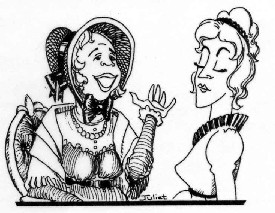
Illustration by Juliet McMaster from first edition of In Defense of Mrs. Elton
This is a true timeslip tale, because I am going to take you back to the days before terms such as Jane Austen Fan Fiction, Jane Austen sequels, the Austenesque, and Austen Variations were known – because they did not yet exist. It is almost as much of a time and mind stretch as remembering the days before the internet or computers – which only people of a certain age can do! But, many years ago, before the internet, take it from me, children, there was no Jane Austen writing market.
Until I came along (she said modestly!) – and oh yes, a few other brave pioneer souls! This is my part of that story.
Way back then, when we typed on IBM Selectric typewriters (no, I am NOT old enough to have typed fiction on a manual machine!), I was already a lifelong fan of Jane Austen, having first read her in my early twenties. This was also before the Jane Austen movie adaptations; I think the only one that had been generally heard of then was the old Laurence Olivier/Greer Garson 1940 film with the anachronistic period frippery costumes. I do not mean to say that there had never been a sequel published, because there were a few; Jane Austen herself gave some hints of what might happen to her characters in future, and two of her nieces wrote continuations. But progress of the genre was slow…sequels seemed to be written at the rate of one or two a century. Seemingly the first piece of actual “fan fic” was a pastiche novel called Old Friends and New Fancies, which was a hodgepodge of characters from all the novels, published in 1913. After that, the most recent one, and the first sequel to Pride and Prejudice, was Pemberley Shades, written in 1949. It was high time for another.
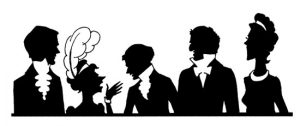
Illustration by Juliet McMaster from In Defense of Mrs. Elton
Despite the sad absence of internet life, Janeites did exist and we were connected to each other. People did not discover Jane Austen through movies then; instead, Janeites read the novels again and again (maybe because there was not much else to do before we had computers). And we joined the Jane Austen Society. JASNA, the Jane Austen Society of North America, was founded in 1979, I joined soon after, and this resulted in making a fabulous network of friends of the great and the good in the Jane Austen world in those early days. At our meetings, we felt a naively excited delighted discovery that there were other people like us, who loved what we loved!
It was in 1985 that Persuasions, the journal of JASNA, held a contest for the person who could best imitate Jane Austen’s style. Since her style was what I had studied so intensely in my hundreds of rereadings, I decided to give it a try, wrote a little sketch of the chatter of Miss Bates – and won! Nothing could have been more exciting and encouraging to me as a young and still unpublished writer. I delighted to churn out Jane Austen pastiche (as I termed it, not knowing what else to call it), and in the early 1990s wrote my first novel, Mrs. Darcy’s Dilemma. This featured Mr. and Mrs. Darcy in middle age, and was set right around the time Queen Victoria came to the throne, in 1837. It was a transitional age, when the railroad was coming into being, and attitudes were changing. The novel visited the lives of the Darcys and their children (one was a bad girl who became an actress), and was quite a refreshing story, being so new.
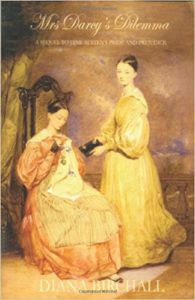 But I couldn’t get it published. I did get a New York literary agent, who was very excited about it, called it a “gem,” and assured me there would be a bidding war. And then we read that two other authors had had the exact same idea (talk about the zeitgeist!) and were coming out with sequels to Pride and Prejudice. They were Emma Tennant with Pemberley and Julia Barrett with Presumption. Both were well established authors, while I was new. Reading an interview with Tennant who said they were “hurrying publication to get ahead of the other sequels,” I lay down on the floor of the bohemian coffeehouse where I did my work, and howled piteously. My agent persisted, but every publisher he took it to said the book was “wonderful, but there is no room for a third Jane Austen sequel.”
But I couldn’t get it published. I did get a New York literary agent, who was very excited about it, called it a “gem,” and assured me there would be a bidding war. And then we read that two other authors had had the exact same idea (talk about the zeitgeist!) and were coming out with sequels to Pride and Prejudice. They were Emma Tennant with Pemberley and Julia Barrett with Presumption. Both were well established authors, while I was new. Reading an interview with Tennant who said they were “hurrying publication to get ahead of the other sequels,” I lay down on the floor of the bohemian coffeehouse where I did my work, and howled piteously. My agent persisted, but every publisher he took it to said the book was “wonderful, but there is no room for a third Jane Austen sequel.”
Read that sentence again! Yes, it really happened – and now, 25 years later, there are literally thousands of sequels, a whole industry! But it is not always a good thing to be ahead of one’s time. “I don’t know what happened,” my agent said, “but put it aside, and ten years from now it will sell.” He was right, for Mrs. Darcy’s Dilemma actually sold to a small English company in 2004, but it was in in 2008 that Sourcebooks picked it up and gave it national publication in America.
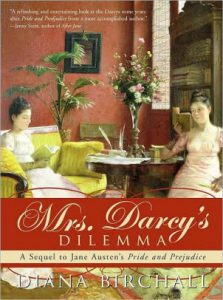
Sourcebook edition, published 2008
Meanwhile, in addition to writing a scholarly biography of my grandmother, the first Asian American novelist, I never stopped amusing myself with my Austen pastiche. My slant was usually humorous, concentrated on style, and with a peculiar penchant for Jane Austen’s villains and grotesques, whom I loved. With the start of the internet and the early Yahoo literary groups, I wrote a serial story defending Mrs. Elton (of Emma fame) and this being the first internet Jane Austen serial, was an exciting ground breaking adventure for me. Each week all my new online friends would question and analyze and discuss and ask me what was going to happen next – it felt like when ships from Britain reached America in Dickens’ day, and people on the dock shouted “What happened next to Little Nell?” My In Defense of Mrs. Elton was published by JASNA as a conference gift in 1999, and also published in England and Australia. Copies are rare, but JASNA put the story online (it is illustrated by Juliet McMaster) and you can read it for free here:
http://www.jasna.org/publications/defense/index.htm
Sourcebooks also published my next book, Mrs. Elton in America, which takes the Elton family to, you guessed it, America, where Mr. Elton is a clergyman. They visit the South in the days of slavery, fail as reformers, go out West for rousing adventures there, and then return to England, with much to tell (or in Mrs. Elton’s case, brag about).
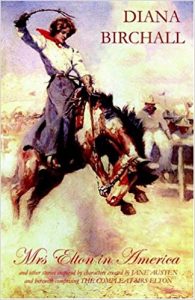
First edition of Mrs. Elton in America
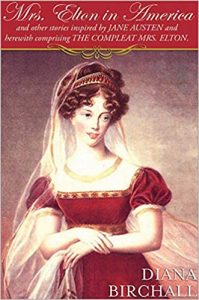
Sourcebooks Edition
With these books I was also an early practitioner of the blog tour, which had just been invented, and did many interviews for the literary blogs then becoming popular. Of course I kept on writing what was now being called the Austenesque, and have literally hundreds of stories in the genre, some of which have been in anthologies, and also plays which have been widely performed in the Austen world. I have certainly enough material to publish several more books, but the changes in publishing, where the author seems to have to do it all herself, have been daunting to me, and I haven’t attempted it. Perhaps I will, now that I’m retired from my job (I worked at Warner Bros as a story analyst). In the meantime, I am so glad to have found a happy, productive and congenial home here at Austen Variations!
To celebrate my career in Jane Austen, I will give away a copy of Mrs. Darcy’s Dilemma. Leave a comment and you will be eligible. And thanks for listening to my fireside tales about Days of Old!
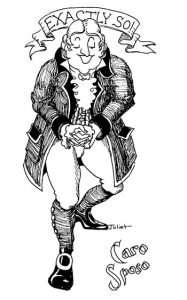
Illustration by Juliet McMaster from In Defense of Mrs. Elton

58 comments
1 pings
Skip to comment form
I too remember the pre-internet world and did actually have a manual typewriter (for school – I am not a writer.) I remember when the Olivier/ Garson version was the only movie version available. I will still watch it (cringing at the fashions) – although the newer versions are preferred. I remember how excited I was when about 15 years ago I discovered “Old Friends and Fancies” and “Pemberley Shades” – the P&P story could continue. I ordered the Rebecca Ann Collins series back when it only came from the author. I was in heaven – rationing the books to make them last. I then found the Carrie Bebris mysteries, Pamela Aidan, and Elizabeth Aston. And somehow fell finally into the world of JAFF on Amazon and discovered wonderful websites such as this.
Thank you Diana and all the authors for many hours of enjoyment and pleasurable reading.
I had a mechanic typewriter in the 80’s for my university studies. I remember I dreamt about having an electric one!
In the early JAFF times, I discovered the Republic of Pemberley website which was like a gold treasure to me. So many information and links and all about Jane Austen!
Unfortunately, though I’m a pro at websurfing, I only discovered the JA fan fiction some 5 years ago… since then, I’m trying to make up for the lost time!
Actually, I misspoke, because I certainly did use a manual typewriter for college essays – but by the time I was seriously writing fiction. the IBM Selectric had become ubiquitous. It seemed the latest word in modernity! Thank you for your comment, Mary, and happy reading…
So glad you stuck with it. I have enjoyed reading your stories. Please continue.
That means a lot to me, Patricia – thank you!
Thank you, Diana – this was fascinating! It was your contributions to the GirlsOwn mailing list that introduced me to the modern world of Austenian fan fiction for which I am very grateful.
Really, Elspeth? Thanks for telling me that! There is some good writing going on in the Austen fan fic field, and I’m glad you’ve been enjoying it. You never know what things lead to…
So happy to become friends with you over so many shared interests. It is time to devote more time to the Austen World as I have enjoyed our conversations and your writings. Of course this has nothing to do with me stalling to write my own book (sarcasm).
That’s nice to hear, Beth, and I enjoy Facebooking with you too (is that even a word? I guess so). Definitely, Austen and the Austen world are very good inspirations for one’s own writing.
It is a rich field, Rosa, and I don’t think you will be running out of reading material for a long time! Isn’t it fun?
Thanks for some perspective on the times in which we live. I will always remember my Mom’s IBM Selectric especially the script font (ball?)
I think it was a ball, Callie! They say that’s the most positive thing about growing old – having a long perspective. Some truth to that. Only you do realize that “a long time ago” really isn’t!
We’ve been friends for many years because of the Internet — since (my guess) around 1995 when I first joined Austen-l. I started reading Austen around age 12-13, P&P and S&S, and read them many times, until at 15 I graduated to MP and (a Bronte) Jane Eyre, which two I then read many times. Before the Internet life was a vacuum, a vacuity, I stumbled onto NA and Persuasion somehow or other by age 17-19, and was so fond of the first and loved the second; finally it was through college I read Emma, age 21, which I did not like as much. The first book I read on Austen was Elizabeth Jenkins and despite going to graduate school, becoming an 18th century scholar, I knew little of now beloved older close reading scholarly books until after I graduate: then Mary Lascelles, Tuve (Some words of Jane Austen), Considering Mr Collins were part of what sustained me in life. As to others reading Austen, there was my father; in college I had been shocked when a majority a people in the row said she was boring. I knew they were boring, dull. It was the Internet, Austen-l that introduced me to the juvenilia; I bought and read letter (how disapppointing at first) and much more. I began to write about Austen on the Net. As to movies, the ones I knew were PBS, the first one I ever watched the 1979 P&P by Fay Weldon. With online used bookstores sites and Amazon in its first phase, and a VHS player I began to buy movies and watch them at will on the angelic computer my husband managed for me. Now I’ve written so many papers, reviews , blogs, have a website, my calendars, postings, and have made some friends in Austen, like yourself. I don’t think this is a superficial change we are talking of, for I believe I know much more and also approach her differently (for better or worse) because of this new social and publishing access world.
Thanks for your comments, Ellen. We certainly have shared our Austen lives, haven’t we?
Absolutely fascinating story of your trials and tribulations. You are to be commended for your perseverance and commitment to the genre. Brilliant the way you moved on and yeah kudos to you! Thanks for this!
Well, I’m still here and still writing, Ruth – it did take some perseverence, thanks for commending that! But it’s been fun and rewarding too. Writers’ lives can be pretty up and down, but practicing in the Austen world is very special and enjoyable. And you meet many kindred friends!
Dear Diana, I rember those “pioneering days” of JASNA so very fondly. Remember the time when we all got our photo in “People” Magazine?
P. S. I would love a kindle copy of “Mrs. Darcy’s Dilemma.” <3
I still have my copy of People, John! Wonderful memories. The drawing is for a paperback copy of Mrs. Darcy’s Dilemma, but I’ll be glad to send you a Kindle one, if you’ll let me have your email address. You can IM me on Facebook, or write to me at birchalls@aol.com
We had a manual typewriter at home but my Typing Class at school used electric machines. I thought that upgrade was amazing. I enjoyed your walk through your experiences as you developed your career. What a journey. You and your author friends have blazed the trail for others. I hope they appreciate your hard work. Blessings on the success of your latest endeavors.
Thanks for commenting, J.W. Garrett, I’m glad you enjoyed my “walk” – it does feel strange to look back at it all from this perspective now! Blessings back to you, and happy reading!
Thank you Diana for sharing your journey with us. I had no idea that sequels/variations existed until I discovered one in a library in 18 years ago and didn’t realize until reading your post how long they have existed. Thank you for the chance to win a copy of Mrs Darcy’s Dilemma.
I too remember pre-electric typewriters. I remember my typing classes with Mrs. Butterworth, oh those were the days. Early to mid 1965, I learned to type on a standard typewriter. In those days you called your friends on the phone and the receiver was attached to a long cord which was attached to the wall. There was no internet and PacMan was just starting to come onto the scene.
What a time it was. These days had all the same problems as we have today; love, sense of belonging and acceptence, popularity and school grades. You have done much for your fellow writers and helped to create a niche in literature which is rich in flavour. Thank you for your hard work, but also for the joy you have brought to many readers including myself. I pray that you continue to provide many hours of reading pleasure.
I see we share a few memories and experiences, Christa! Who would ever have dreamed of the internet? Yet you make a true observation – life isn’t really all that much different. Thank you so much for your kind words, it has been extremely rewarding to share my joy in Austen, and I also share your wish that I may continue! Blessings.
I love hearing about the history of the genre generally so thank you for taking me down memory lane. I’ve got to go track down your books!
Glad you enjoyed the memory lane, Leigh, I very much enjoyed telling about it! Thanks for commenting, and for looking for my books. You can read In Defense of Mrs. Elton online, as I mentioned above, and Mrs. Darcy’s Dilemma is easy to find. Though I just noticed that somebody else has now written a variation using my title. Arggghhh!
Oh, the IBM Selectric. And data entry keypunching on cards, and then 5 1/2 inch floppy disks. So many changes.
Thank you for the trip down memory lane. And for sharing your stories with us.
Floppy disks, Linda, haven’t thought of those in years! Glad you enjoyed the memory journey – it was fun for me to do!
I began reading Jane Austen when I was about 10. My mother gave me paperback copies of Sense and Sensibility and Persuasion ( unlike most people, P&P was not the first Austen book I read). I was an English major and did graduate work in Engl8sh and Library Science, focusing on the history of books and bibliographic description. After graduating, I worked as a cataloguer for several rare book dealers and began collecting Jane Austen. In the late 70s, there was little Austen available in used/rare bookstores. I began looking for sequels/prequels/continuations. Besides Old Friends and New Fancies (Brinton, 1913), I found Margaret Dashwood or Interference (1929), The Ladies (Barrington, 1922), Susan Price or Redemption (Brown, 1930) Somehow Lengthened:Development of Sanditon (Cobbett, 1932), Jane Fairfax (Smith, 1940), ThexWatsons (Oulton, 1923), and The Watsons (Brown, 1928). In other words, very few sequels, prequels, continuations before 1940. I stopped collecting in this area in the 1980s after there was an explosion of publication of this material. I had access to Anna Austen Lefroy’s manuscript of the Sanditon continuation and transcribed and edited it. It was published by a five press in 1983.
Mary, thank you so much for your own memories! I have got your edition of the Sanditon continuation, so you dwell in my house! However, I am rather startled and abashed to know that your scholarly researches have revealed to me for the first time, the titles of a couple of early sequels completely unknown to me. I’ve never even heard of Margaret Dashwood and Susan Price! What rarities. And I thought i had a fair knowledge of early Austeniana. It was interesting how the sequel field simply exploded, as it stopped being a recherche curiosity, and became a genre.
The idea of Emma Tennant’s book being chosen over yours is just horrifying! But as someone who collected many rejection letters informing me there was no market for Austen-related fiction, I know that’s just how the publishing industry saw it. I’m so glad you finally got it published, and I hope to see your other writings published (and I intend to nag you to make sure they do come out!).
Well, that was part of the pain, Abigail! Emma Tennant, that book was SO bad! I think I just lost heart after awhile. It’s something I still don’t quite understand, because you know I’m really pretty tough, persevering, and wouldn’t stop writing for anything. A writer must rebound from the inevitable disappointments, and I have no problem comprehending that part. I still write – but I don’t wanna fight to write, if you see what I mean! And having said that, I am so very glad that you are there to nag me once in awhile! I need it!
You lucky lady! You got to type on an electric typewriter. I had to LEARN typing on a manual typewriter (while in high school, form which I graduated in 1962). Of course, since my family was poor, I was told to learn typing and office machines (all manual) by my high school counselor, who felt it was unrealistic for me to take college preparatory courses since my best career option would be to work in an office as a secretary. So wonderful that you (and the other fan fiction writers) kept on with your dreams. Thank you for sharing your stories with us.
Well, I had to learn on a manual too, Cheryl – you and I are contemporaries! (Class of ’63) I wrote my school papers on a manual. I only meant that by the time I was seriously writing fiction, and also working, the Selectric had mercifully arrived. I did go to college but it wasn’t easy, since I was a Teenage Mother! My son was born when I was 18, and I took college courses at night. Those were the days, but I think I had a lot more energy then! Thanks for reading my stories.
I loved reading about your history in the Austen-related publishing world. Congrats on being one of the pioneers!
Aw, thanks, Pam, for reading and for the congrats! It was both fun and strange to be looking back like that…
Loved reading this Diana thank you!
Thanks for commenting, Amy, and I’m glad you liked it!
That was truly enlightening, Diana. I love learning about the early years of JAFF, and you were indeed a pioneer. Thank you for the vivid picture you draw here of the way times have changed for JAFF authors and readers.
Glad you enjoyed reading my “history,” Jan. It does seem odd to be looking back and realizing all that I’ve seen. Things do change all the time in writing fields and fashions, and it’s been a fascinating journey.
Thanks for your comment, DarcyBennett, I’m glad you enjoyed the journey…and that you share my love for “more Austen”!
I found these early sequels/continuations before Gilson’s bibliography was published, so I was just lucky to find them. It’s so interesting comparing the J section of Gilson to how many items are now being published. I remember reading reviews as a librarian and seeing an entire page of sequels, etc. In an issue of Publisher’s Weekly. That’s how crazy it is now. And that doesn’t even include the self published books that can be found on Amazon!
Ah, well, you searched and collected with the Librarian’s Eye, Mary, which is what I lacked! It is indeed a marvel to compare the Gilson bibliography to what there is today, the mind truly boggles. Traditional publishing and self-publishing are very blurred now, much of the self-pubbed work really amounts to their own publishing businesses, and often does much better than the traditional publishing. And neither is automatically “better” now. Some of the most brilliant creative authors forge out on their own. It’s really fascinating to watch!
Absolutely fascinating read, Diana! Thanks so much for sharing this with us, and for sharing your wonderful talent too.
Author
Oh, Joana, thank you so much! It was such a pleasure telling readers and other writers about my experience from a time just before theirs. As you can see it was a little bittersweet, and I know many writers end up feeling that they could have done more, gone farther, with their “talent,” as you are kind enough to call it! But I can honestly say that no time with Jane Austen was ever wasted. 🙂
Here’s a different kind of reply: The changes are not small things. I’d like to add that the experience insofar as true enjoyment of Austen goes is ambiguous. Reading is personal and it is a solitary experience, a deep gratifying encounter that is at the core of literary studies. It is so much a given that we are supposed to be _for_ social life and we ourselves enjoy being with other people and seeing new places or going somewhere. And it gratifies egos to have books published, and see Austen gives us these characters and stories to play with, and an audience familiar with them, but not most of them deeply engaged with Austen’s text We have more friends, many more acquaintances.
But I have an idea that there is a perspective where all this ruins the reading and pleasure of Austen — associated with her are now abrasive, status-seeking, moneyed (or not if you’ve not got it so you are excluded) holidays, at these places cliques grow up. Many of the movies try to convey aspects of her book but many ride roughshod and there are film-makers who make famous Austen films who clearly dislike her (the woman who made the 2007 MP, the 1986 NA — she loathes Fanny to the point she cursed her), Joe Wright turns Austen into Lawrence. I get so busy with this internet life which brings on papers, projects and so on I have not been able to make time for Maggie Lane’s Growing Old with Austen — I know it’s the kind of book which extends our enjoyment because it’s an accurate, deeply felt intelligent close reading. She does pander and makes sure she is upbeat on the surface and she is not Austen.
There is a problem. I see Nancy Mayer started the tired (yes tired) question of how we are to feel about Lady Russell and before you know it you have the usual justifications of the anguish and agony that woman caused both Anne and Wentworth (of course he was hurt, of course he stayed away); it was not his or Anne’s fault: it was Lady Russell’s, only in small part Anne’s (for being so docile) and Wentworth’s (for being so hurt). All the tales Austen alludes to in Crabbe have the young couple’s lives ruined. But we have gone over this too many times before and it can grate if you have been hurt as Austen clearly was — remember Cassandra’s marginalia to this: Jane had the right to speak now when she’s older having know the emotional pain when younger.
So there are only 6 books finished and enough people reading them insist on justifying the world if you bring out into the public realm the serious questions.
What is there more loathsome than celebrity worship — alas, I rather suspect Austen would have hated it out of snobbery as much as anything else, and understandable resentment given how she was treated as a spinster.
We can’t go back — I love many of the critical books and have been amused and interested moved by a few of the original sequels, engaged even deeply by some of the movies, have worlds I know about and can visit so life is not so hard to endure alone. We wouldn’t have Austen variations, but I think the core experience is harder to sustain than it once was.
Ellen
Interesting thoughts, Ellen, and I’ll try to respond on the Austen lists tomorrow, as this isn’t really the optimal forum for extended discussion.
I already have a copy of Mrs. Darcy’s Dilemma, which I got before I “met” you on the Internet, so I don’t need to be in the drawing! I just wanted to say I enjoyed the well-written blog.
Author
Thank you so much, Diane. I am so happy to think of you exploring Malta – and will say no more about the travel mishap! 🙂
I remember trying to get my English teacher MIL to read Julia Barrett’s “Presumption”when it came out and being snubbed. Thank you for your contributions to wild world of JAFF. You could almost say it began with Heyer, long before the internet.
Gwyn, you bring up an interesting point – the way Austen related novels used to be considered some sort of sub species, beneath contempt. That was the general view for a long time. So it’s something of an achievement that the genre has now gained acceptance on its own merits. You’ll find the most popular titles in bookstores such as Barnes & Noble, and in libraries. So this is an advance! And yes, I agree, even though Heyer’s novels aren’t literally Jane Austen-related, she certainly was paying tribute to Austen and owed some of her inspiration to her. Thanks for the comment!
I asked for and received a manual typewriter as a high school graduation gift. Electrics were around, but I liked writing in odd corners (often outside), so I liked the portability of the manual. And mine was high-tech with a correction ribbon included!! God bless the inventor of Liquid Paper (whom I understand was the mother of Mike Nesmith of the ’60s music group the Monkees–and Mike also invented a little-known venture called MTV).
I came to Jane Austen later in my “literary” career, not reading her works until grad school in a Gender & Satire seminar. My essay on civility in P&P, S&S, and MP didn’t garner a high grade because I was “too gracious” and “not militant in approach.” Since when was Austen “militant”? Her satire was all the more powerful in coming from a more gracious world and tone.
I came to JAFF late, too–not until about five years ago when I came across a book by Abigail Reynolds in the library. I adore JAFF now and after immersing myself in reading hundreds of JAFF works, I hope to transition from writing fanfics based on a more modern series of books into writing JAFF. We’ll see how it goes.
And I am ever so thankful for pioneers of JAFF such as you, Diana! (And in my not-so-humble opinion, Emma Tennant’s book was awful; I couldn’t finish it…the only JAFF I ever started and couldn’t [not “didn’t”…couldn’t!] finish. )
Thanks for this wonderful post!! So delightful…as are your books, Diana!!
Warmly,
Susanne 🙂
Hi Susanne – I didn’t know that about Mike Nesmith, neither the
Iiquid paper or MTV! Where have I been? And I’ve always liked the Monkees. You gave me a good laugh about not being “militant” enough in your JA criticism – what does that even mean? I do like my JAFF more of the old fashioned variety, largely because I prefer reading about the 18th/19th centuries rather than the present. I think you’ll enjoy the change. Thanks for reading …I do hope we can meet sometime, we’re not that far apart!
I am looking forward to reading your book. I enjoy you on facebook, and will look to see what books I have that you might have authored. I have so many books in boxes.
Thanks for reading, Jean – I enjoy you on Facebook too! Don’t we all have lots of books in boxes…
Thank you for taking us on a trip down memory lane, Diana. There are many things of the past pertaining to JAFF that I wasn’t aware of. I hope you will self-publish your newer works as it has been a very long time since you have your own book out.
Thanks, Lucien – perhaps I will publish but am not enthusiastic. Been there, done that. There are thousands of these books now, so I don’t see much point in going to all the trouble. I do enjoy keeping my hand in with plays and stories, but that’s just sheer fun!
DarcyBennett is the winner of the giveaway! Please IM me on Facebook, or write to me at birchalls@aol.com to tell me your address, so I can send you Mrs. Darcy’s Dilemma. I have also promised to send John Karlsson a Kindle copy of the book, but I will need his email address for that. Thanks!
Congratulations to the winner.
[…] a blog about her experiences as an Austen reader and then post-text writer in the social world before and since the Internet: “Throwback Thursday. Her perspective is as someone who has written and published several […]